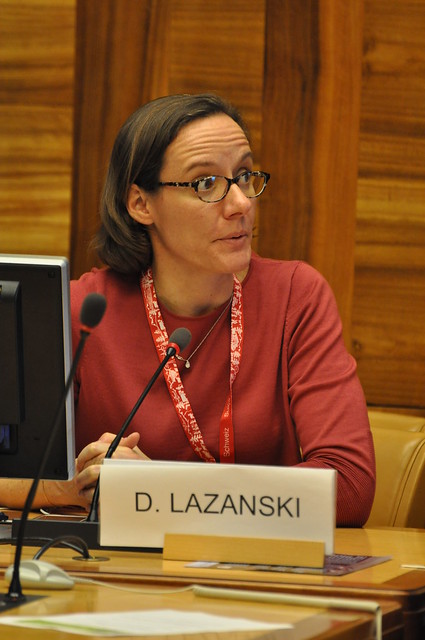
Cybersecurity capacity starts with partnerships
The International Chamber of Commerce (ICC) Business Action to Support the Information Society (BASIS) initiative joined forces with Oxford University’s Global Cyber Security Capacity Centre and the Organization of American States to raise awareness of the value of on-going partnerships in cybersecurity capacity building efforts globally.
Bringing together a range of cybersecurity experts, the multistakeholder workshop was held during the 12th Internet Governance Forum, taking place this week in Geneva and featured a breakout discussion to share views.
The workshop heard how all Internet users need to be able to identify risks and manage threats effectively to take advantage of the opportunities that the Internet offers and how these efforts require a multistakeholder approach.
Collaboration key to address cybercrime
Sadie Creese, Founding Director of Oxford University’s Global Cyber Security Capacity Centre told participants: “We didn’t design our cybersecurity capacity maturity model in isolation. We recognized that cybersecurity is inherently multistakeholder and disciplinary, and it was designed in partnership with stakeholders from all sectors from around the world.
Reacting to feedback from beakout discussions, Ms Creese said: “The key to success will be to develop solutions that are culturally sensitive and therefore we have to not only do that in a multistakeholder way, but we will have to do that in a globally multistakeholder way. “
We recognized that #cybersecurity is inherently multistakeholder & disciplinary. It was designed in partnership with stakeholders from all sectors, from around the world. #IGF2017 #netgov @sadiecreese pic.twitter.com/IMwwN0tkRR
— ICC NetGov (@ICCnetgov) December 19, 2017
Event participants looked forward to the digital future and discussed opportunities for scaling up these efforts and leverage their learnings to address implementation challenges in cybersecurity capacity building, an essential dimension for bridging digital divides.
“Behind governments, there are human beings,” said Belisario Contreras, Cyber Security Programme Manager at the Organisation of American States (OAS). “We have been learning through the process from issues in the region and actually learning from people in Africa and Europe and Asia. It has been a very complicated process. It has not been very easy. Our work was purely government focused at first and only focused on certs or on a specific training. But that notion has completely changed… We are always trying to learn from other experiences and share them with our member states.”
We’ve been learning from people in Africa, Europe & Asia. It’s been very complicated & work was purely government focused at first. That notion has completely changed. #cybersecurity #multistakeholder #IGF2017 pic.twitter.com/yL7uglQeiV
— ICC NetGov (@ICCnetgov) December 19, 2017
Carmen Gonsalves, Head of International Cyber Policy of the Netherlands Ministry of Foreign Affairs said: “As a government, we discovered that working closely together with other stakeholders, with the private sector, academia, the tech community, was quintessential to overcoming challenges. That helped us, in our process, to work to the next level of maturity in cybersecurity.”
Working with other stakeholders, was “quintessential” to help the Netherlands overcome a major breach. That helped us, in our process, to work to the next level of maturity in #cybersecurity #IGF2017 pic.twitter.com/gSmtRxCl1Y
— ICC NetGov (@ICCnetgov) December 19, 2017
Building trust
Lilian Nalwoga, President on the Internet Society’s Uganda Chapter said: “We are seeing lots of improvements in how governments or businesses react to cybercrime incidents. But going on the issue of trust and confidence, we are seeing that when things are secure or when people have trust, it will lead to the realization of a better Digital Economy.”
Lilian Nalwoga, President of the Internet Society – Uganda Chapter: When things are secure or when people have trust, it will lead to the realization of a better Digital Economy. #IGF2017 #CyberSecurity #netgov pic.twitter.com/1YUWJUnEJC
— ICC NetGov (@ICCnetgov) December 19, 2017
The maturity of cybersecurity capacity in a country encourages confidence in the online environment and fosters meaningful access by all groups in society, thus helping address digital divides. There is a broad agreement that collaboration between stakeholders at the local and global level to mitigate potential threats and foster access is crucial for this effort.
Audrey Plonk, Director of Government and Policy Intel said: “The private sector is developing the products and putting them out in the environment. We need people on the other side, whether it’s in Civil Society or government or other companies to be able to work with us on dealing with issues that affect multiple platforms.”
Audrey Plonk of @intel The private sector is developing the products & putting them out in the environment. We need people on the other side, civil soc/governments & other companies to work with us on dealing with issues that affect multiple platforms #IGF #cybersecurity pic.twitter.com/pWvWUwb0hp
— ICC NetGov (@ICCnetgov) December 19, 2017
Dominique Lazanski of GSMA moderated the session and noted: “We can see some very common themes coming through. I would say, trust, education, awareness, and the participation of all stakeholders meeting with different sort of abilities and different experiences as well.”
ICC believes that leadership is crucial when it comes to taking action and ensuring information security best practices are adopted within enterprises. That’s why we developed the ICC Cyber security guide for business, a pragmatic guide to starting a cybersecurity conversation between information technology specialists and company management.
More details about the workshop and IGF can be found here


